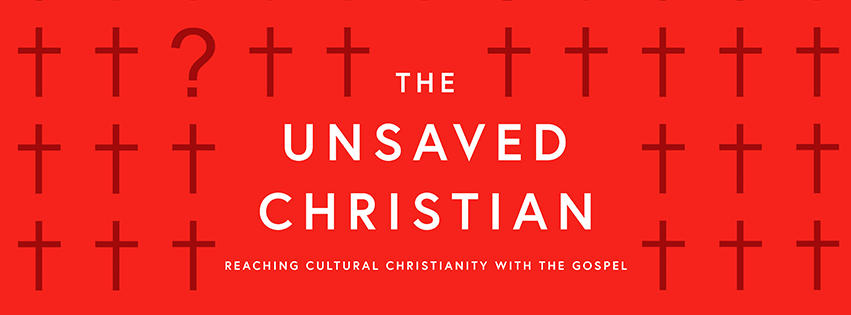While on vacation earlier this month I had the opportunity to read Dean Inserra’s new book, The Unsaved Christian: Reaching Cultural Christianity with the Gospel.[1] The book was, in some ways, eye-opening. However, the book also helped to reinforce some of my own observations from nearly fourteen years of pastoral ministry.
The purpose of this post is to share some of the best quotes from each chapter of the book.
Chapter 1 – Help Them Get Lost: The Case for Reaching Cultural Christians.
“What he (Dean’s friend, Matt) was describing was Cultural Christianity: a religion that, I believe, is practiced by more Americans than any other faith or religion. Its participants can be found in Catholic or Protestant churches, in the South and Midwest, on high school football fields, at patriotic celebrations, and around family dinner tables. It looks and sounds very Christian on the surface, but is merely Christian by culture, rather than conviction. The gospel of Jesus Christ is not part of the equation.” (13)
Chapter 2 – Religion Without Salvation: Characteristics of Cultural Christianity.
“When we think of unreached people groups, we envision intrepid missionaries taking the gospel to a place where the name of Jesus has never been spoken. But many American pastors are faced with a similarly daunting task: to bring Jesus to a place where He is admired but not worshipped, where God is a grandpa in the sky, where many of their congregants are ‘good people’ who don’t know they need to be saved. Like their New Testament counterparts from Matthew 7, they know religion, but they don’t realize that their religion is the very thing from which they need to be saved.” (30)
Chapter 3 – Civic Religion: Generic Faith that Demands and Asks Nothing of Its Followers.
“Self-proclaimed Christians who worship a god that requires no sacrifice, no obedience, no submission, and no surrender are not worshipping the God of the Bible, no matter how much they claim they love Jesus. In His own words, Jesus tells us what it looks like to love Him: ‘If you love me, you will keep my commands’ (John 14:15); ‘If anyone loves me, he will keep my word’ (John 14:23). Many people want the good-luck-charm Jesus, not the sacrificial Lamb of God whose death requires action.” (38)
Chapter 4 – Bridging the Gap: Challenging Cultural Christian Beliefs.
“For the Cultural Christian, morality is usually determined by how you’re perceived by others.” (50)
Chapter 5 – Overcoming Obstacles: Barriers to Reaching Cultural Christians.
“Many Cultural Christians simply don’t know the difference between what they believe and true Christianity. The only difference they detect with their Christian friends is that they are just ‘really into church’ or ‘very religious.'” (61)
Chapter 6 – False Assurance: Once Saved, Always Saved.
“Overemphasizing a prayer or rite of passage can blind one to the primary calls to salvation, repentance, and faith. When parents insist their adult son or daughter is a Christian because of a childhood prayer or church milestone, they can miss an opportunity to share Christ. Consequently, they can push their child further away from saving faith by creating gospel confusion. This results in a faulty understanding of the gospel in the child and a faulty view of eternal security in the parent, who insists a loved one is a Christian because of their familiarity or background with the church.” (65)
“Jesus gives us a guide for what true conversion looks like for the Christian: hear the word, understand the word, produce fruit. These are the marks or evidence of genuine salvation.” (67)
Chapter 7 – The Country Club Church: How Lax Church Membership Fosters Cultural Christianity.
“It is important to remember that unsaved Christians are not seekers. Church (with its traditions, institutions, and programming) is not foreign to them. ‘Joining’ a church by becoming a member was likely part of their upbringing and a familiar practice. It is fair to say that church membership is an unspoken expectation for Cultural Christians, even if attendance is sparse.” (75)
“Cultural Christianity is a strange bird, indeed. Even if one is seldom seen at church, it is important in Cultural Christianity that one can at least claim a church as his own.” (76)
“I am convinced that a primary reason Cultural Christianity isn’t challenged in some churches is because pastors are afraid those people will leave if offended. A church that refuses to call people to die to themselves and follow Christ is going to be full of people who admire and are ‘cool’ with Jesus, as long as He doesn’t interfere with their lives. Push beyond the casual admiration of Jesus and the country club church will lose members (who will go pay their annual dues to a different church across town), and that is far too much risk for the pastor running the clubhouse.” (83-84)
Chapter 8 – Christmas and Easter: Moving Beyond Cultural Observance to the Life-Changing Implications.
“There is a difference between faith as verbal affirmation and faith as a conviction. The former dresses up for Easter, the latter is clothed in Christ (Rom. 13:14).” (96)
Chapter 9 – Making Decisions vs. Making Disciples: Why Raised Hands and Sinner’s Prayers Don’t Necessarily Indicate Salvation.
“A gospel presentation that makes heaven the point of the decision is a Cultural Christian gospel one might not even realize they are presenting….This is a sensitive matter for many, because ‘praying the sinner’s prayer’ is often viewed as the magic key to salvation, along with an altar call or a raised hand. These rites of passage can provide a false assurance, since God never promised to give salvation to someone because they prayed a certain prayer. Rather, the Bible shows that those are saved from sin and reconciled to God who repent and believe the gospel….If a prayer is a means to understand that and the reality of heaven is part of what is grasped in understanding the gospel promises of our Lord, fantastic; but apart from that, a ticket to heaven by way of a scripted prayer is not the gospel.” (109-110)
Chapter 10 – God Shed His Grace on Thee: Partisans, Politics, and Prosperity.
“The American church’s celebration of patriotism can fan the flame of the all-encompassing, generic god of Cultural Christianity by not only leaving it unchallenged, but giving it a platform. When churches bring out all the stops in observance of the cultural high holy days (Memorial Day, the Fourth of July, and Veterans Day), it can perpetuate the notion that God and America are attached at the hip. This is especially true in much of conservative evangelicalism with roots in fundamentalism. You may find, on the Sunday’s closest to these holidays, that many churches embrace American patriotism so fervently that the Pledge of Allegiance seems to be the creed, the American Flag a holy relic, and the National Anthem a psalm.” (120)
Chapter 11 – The Moral Theist: Reaching the Good Person Who Believes in God.
“In Cultural Christianity, I believe the root cause of resting in one’s righteousness is ignorance more than arrogance. Many Cultural Christians can say they have met the cultural expectations regarding lifestyle, work, leisure, and family; they’ve always been led to believe they are good people who have faith and try to do the right thing. This may make a great neighbor, but it doesn’t save. And therefore, people in this category are in need of true gospel belief.” (132)
Chapter 12 – Hail Mary, Notre Dame Wins: Reaching Generational Catholics.
“You may find that nominal Catholics have never opened and studied a Bible personally, so it can be refreshing for them to hear biblical principles shared from Scripture.” (148)
Chapter 13 – The Watered-Down Word: Reaching Mainline Protestants.
“When biblical authority is neither established nor believed, the only possible outcome for moral and ethical issues is that God will change with the times. Culture, popular opinion, pragmatism, and the desire to be liked or perceived as accepting become the governing authorities.” (161)
Chapter 14 – Faith, Family, and Football: Ministering to the Bible Belt.
“The Bible Belt version of Cultural Christianity can outwardly seem pretty in step with actually following Jesus as Lord. In most cases, there isn’t glaring heretical theology. The people know Bible stories and verses, attend church, can say the Lord’s Prayer from memory, and take pride in identifying as a Christian. It sounds really close to the real thing, because it is an all-consuming part of their lives. This makes things very complicated and also very urgent for mission, and the difference between ‘close’ and ‘wrong’ have eternally catastrophic consequences.
This really can be summed up in the remorseful words of the creator of the Christian children’s entertainment sensation, Veggie Tales, about his work: ‘I had spent 10 years trying to convince kids to behave Christianly without actually teaching them Christianity.’ It is certainly easy to confuse morality with the gospel, but this is a mistake the church can no longer afford to overlook.” (170)
Chapter 15 – The Harvest is Plentiful: Challenging Cultural Christianity with Courage and Love.
“Taking the gospel message to the nations requires a passport, a flight, and a clear plan. Reaching a Cultural Christian requires three primary things: a refusal to be in denial, gospel clarity, and boldness to speak the truth in love.” (182)
Conclusion – A Heart Check for Us All: How Do I Know I’m Not a Cultural Christian?
“The way we can know if we are not the people of Matthew 7:21-23, is to make sure we are the fruitful trees of Matthew 7:17-20. Jesus is not advocating for a works-based salvation, but rather for the evidence of an actual saving faith.” (188)
These are only some of the highlights and challenging portions of the book. If you are a pastor, I could not encourage you enough to read The Unsaved Christian. If you are not a pastor but want to know more about the topic, I also encourage you to read this excellent book.
You can purchase The Unsaved Christian at Amazon by clicking here.
[1] Dean Inserra, The Unsaved Christian: Reaching Cultural Christianity with the Gospel, (Chicago: Moody Publishers), 2019.




